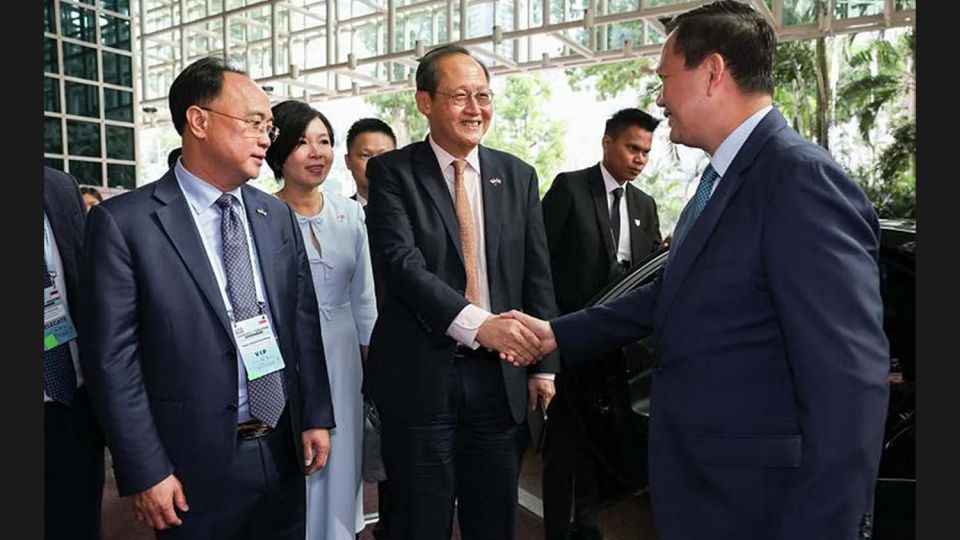June 20, 2024
SINGAPORE – Singapore companies are stepping up investment in Cambodia, drawn by the country’s progressive economic road map and the increasing ease of doing business there.
Green energy, healthcare and agri-food are among the most promising sectors, noted speakers at the Cambodia-Singapore Business Forum held at the Conrad Centennial Hotel in Marina Bay on June 19.
The event was organised in conjunction with the first official visit of Cambodian Prime Minister Hun Manet to Singapore.
Mr Hun Manet told the 300 or so business leaders and government officials from both countries: “Singapore’s investment has played a pivotal role in Cambodia’s development, fuelling growth in various sectors such as manufacturing, real estate, hospitality and more.”
He also outlined the Cambodian government’s steps to increase the ease of doing business, such as streamlining regulation, improving trade connections and providing incentives such as tax breaks of up to 15 years for priority sectors.
Mr Hun Manet, who was giving a keynote address at the event, highlighted the green economy and digitalisation as key areas in which Singapore investors could advance Cambodia’s progress.
Dr Tan See Leng, Singapore’s Manpower Minister and Second Minister for Trade and Industry, said the forum’s strong turnout demonstrated the continued interest from Singapore companies to explore opportunities in Cambodia.
He noted that Singapore and Cambodia businesses, and the partnerships they have formed, have substantially contributed to the growth in foreign direct investment (FDI) in Asean as supply chains shift.
Singapore was Cambodia’s second-largest source of FDI in 2023.
Bilateral trade grew to more than $2.5 billion in the first four months of 2024, which Singapore Business Federation (SBF) chairman Lim Ming Yan noted in a speech was a 42 per cent increase over the same period in 2023.
Dr Tan also cited examples of successful partnerships across the aviation and waste management sectors and the green economy, adding that Singapore will further advance collaboration on renewable energy and sustainability.
One initiative is to continue to facilitate the development of projects to realise the vision of an Asean-wide power grid, such as the import of renewable energy.
Singapore and Cambodia are also working on finding a legally binding implementation agreement for collaboration on carbon credits under the Paris Agreement, which was the subject of a memorandum of understanding signed in May 2023.
Dr Tan said: “This collaboration will advance both countries’ climate ambition and channel financing towards additional mitigation efforts.”
Later in the day, Senior Minister Lee Hsien Loong called on Mr Hun Manet at the Shangri-La Hotel.
The ties between the two nations were also cemented via agreements struck at the forum, which was organised by the Cambodia Chamber of Commerce (CCC), SBF, the Singapore Chamber of Commerce in Cambodia and the Singapore Alumni Association of Cambodia.
The SBF and CCC inked a memorandum of understanding to deepen cooperation on facilitating trade and economic linkages.
Another memorandum was signed between Acleda Bank, Phillip Bank, Sathapana Bank, Wing Bank, ABA Bank, Anext Bank, Sing Investments and Finance, Liquid Group and Proxtera to mark the start of the Singapore-Cambodia Financial Transparency Corridor.
The corridor facilitates information exchange between financial institutions in both countries, fostering trust. In doing so, it empowers them to better assess risks and provide enhanced and faster financing for small to medium-sized enterprises trading across borders, the SBF said in a statement.
A panel discussion on investment opportunities in Cambodia followed the speeches.
The panellists were Mr Suon Sophal, deputy secretary-general of the Cambodian Investment Board; Mr Sok Piseth, vice-president of the CCC and chief executive of G Gear Group; Mr Atul Temurnikar, co-founder and chairman of Global Schools Foundation; and Mr Goh Chee Kiong, chief executive of Charge+.
They touched on how investors could qualify for government incentives, what is needed to set up a business there, and the allure of Singapore as a destination for Cambodian firms seeking to internationalise, among other topics.
Charge+ was cited as one Singapore firm that has established a foothold in Cambodia by providing charging services for electric vehicles since 2023.
Mr Goh of Charge+ told The Straits Times that the firm intends to expand its footprint in Cambodia from around 30 charging stations to 3,000 in the next five years or so.
He added that Cambodia was “a very natural choice” due to the government’s plans for sustainability and energy use, and the rapid growth in adoption of these vehicles.
Entrepreneur Dennis Ng said Singapore’s longstanding relationship with Cambodia, which was among the first countries to recognise the Republic’s independence at the United Nations, contributed to his decision to set up the non-profit Kent Ridge International School in Phnom Penh in 2013.
Most of the about 200 students in the school are Cambodian students on scholarships.
“(Cambodia) was the first place we were going to… to show the Singapore spirit,” said Mr Ng.
“We need our Asean neighbours, and it is good for the future generation to build relationships.”


